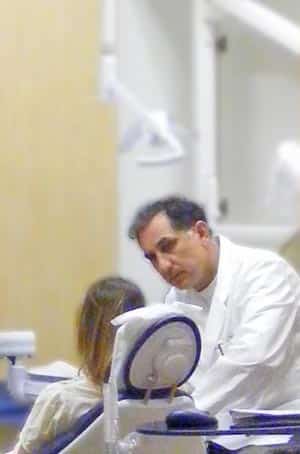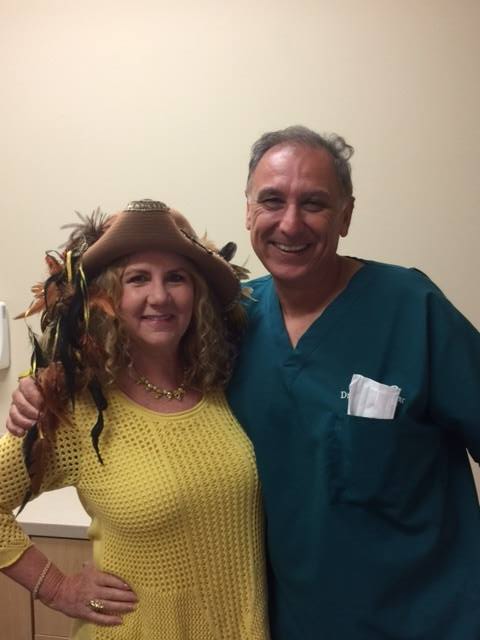Dr. Gediz Barnar is an honors graduate of the Aegean University, School of Dentistry, where he received his first D.D.S. degree with training in all aspects of General Dentistry. Dr. Barnar received his post graduate Advance General Dentist degree from University of Loma Linda, School of Dentistry in Southern California. After completing his degree Dr. Barnar decided to practice dentistry in his private office at Mission Viejo.
Through a combination of state of the art technology, sensible treatment plans and genuine devotion to the unique needs of each patient, Dr. Barnar preserves healthy teeth and gums, alleviates oral discomfort and improves the appearance of smiles on a daily basis. He has applied his unique blend of artistic and technical skills to produce durable and aesthetic results in thousand s of patients. A dentist with a grasp of the most innovative, minimally invasive new procedures, Dr. Barnar is dedicated to lifelong learning through continuing education courses.
Dr. Barnar is licensed by the Dental Board of California and is a member of the American Dental Association, American Academy of Cosmetic Dentistry and California Dental Association. He is fluent in English and Turkish.
WHAT ARE DENTAL IMPLANTS?
Dental implants are synthetic teeth roots. They are used to create foundations for replacement teeth. When teeth need to be replaced due to an accident or disease, give Turquoise Dental a call at (949) 454-7474 to learn if dental implants are right for you.
WHO CAN HAVE DENTAL IMPLANTS?
In general, any person at any age may need dental implants. However, it is important to Turquoise Dental that you:
- Commit to good oral hygiene
- Have enough bone to hold the implant in place
- Are healthy enough to undergo oral surgery
- Have healthy gums
- Continue with regular dental visits
Certain people may need to be more closely examined to determine if they are good candidates for dental implants. This can occur if you:
- Are a heavy smoker
- Suffer from uncontrolled chronic disorders (like heart disease or diabetes)
- Have had radiation therapy around the head or neck
WHY SHOULD I GET DENTAL IMPLANTS?
There are many reasons why dental implants may be right for you. When looking into tooth replacement, consider the following attributes of Turquoise Dental’s dental implants:
- Comfort: each implant is individually placed and therefore more comfortable than dentures or bridges
- Strength: if taken care of properly, they can last you for your entire life
- Fit: tends to be better than dentures or bridges
- Appearance: they look and feel like your teeth
- Speech: since they won’t slip out, you do not run the risk of your implants slurring your words or causing you to mumble
- Eating: they stay put so you can eat more easily
- Oral Health: other teeth do not have to be altered to fit, like with a bridge, so your teeth are left intact
- Flossing: you can floss around your dental implant and other teeth
- Cleaner: unlike dentures, there is no need to disinfect or deal with adhesives to keep them in place
HOW DO I GET DENTAL IMPLANT?
To begin the dental implant process, you should first make an appointment with a licensed dentist. The friendly staff at Turquoise Dental is ready to take your call and answer any questions you may have about the process. We will create a personal treatment plan for you based on your specific situation.
HOW DO I TAKE CARE OF MY DENTAL IMPLANTS?
Dental implants should be treated just like your real teeth. It is important to brush, floss, rinse with ADA approved mouthwash, and schedule dental check-ups regularly. This will keep your implants and teeth looking great and working well.
Give us a call at (949) 454-7474 to set up a consultation so we can help you decide if dental implants are the right move for you.
What is plaque and how is it bad?
Plaque constantly forms on teeth. It is a clear film of bacteria that builds in hard to reach areas such as between your teeth and in the lines of your gums.
When allowed to accumulate, the plaque can irritate the gums and lead to certain gum diseases, such as gingivitis. Research has provided evidence that gum disease has been linked to many health problems including stroke, heart disease, pneumonia, and even pregnancy complications
Plaque can be removed with regular brushing and flossing along with professional cleanings from dental professional to help with tough tartar removal. Early stages of gum disease are often unnoticed. By the time you begin to feel pain or irritation, it may already be too late to focus on prevention. Regular checkups can assist in preventing plaque and tartar from building up,as well as prevent many other dental complications.
What is the cause of bad breath?
When breath has an unpleasant odor, it is known as “halitosis”. Depending on the cause, the odor can occur occasionally, but it has been known to become more of a long lasting problem with some people.
The mouth contains millions of bacteria. The back of the tongue can condense bacteria and cause of bad breath.
Although bad breath and the accumulation of odor forming bacteria can be considered a common problem, there are many causes of why frequent halitosis can be occurring. Such problems could be:
Poor dental hygiene – If brushing and flossing is not conducted on a regular basis, bacteria and plaque can begin to form in hard to reach places. If this is the situation, poor dental hygiene can eventually lead to much more serious problems.
External sources – Smoking, chewing tobacco, drinking coffee, tea, or wine are just some of the causes of regularly occurring bad breath. These activities can also lead to the discoloration of teeth.
Why are dental X-rays needed?
In dentistry, no mouth is the exact same. In order for our professionals to assess your individual needs, X-ray imaging helps identify any underlying signs of bone loss or gum disease that can be undetectable with the naked eye. It is typical for new patients to undergo a full set of dental X-ray imaging for the dentist to get an idea of their oral health status. In order to help with future comparisons, we may request additional X-ray images be taken during follow-up visits in order to determine what treatment will be needed, as well as to identify any conditions that may require action.
How safe are dental X-rays?
Dental radiographs, or X-ray generated images, are necessary in receiving the highest standard of care. The diagnostic benefits far outweigh the minimal risks involved in the use of dental X-ray imaging. We are careful to limit the amount of radiation exposure for patients by using lead aprons and digital radiography, which reduces radiation substantially. Without the use of X-ray generated images, conditions like cavities, extra teeth, and diseases could go undetected. Digital X-rays have minimal radiation, detailed images, and remarkable speed. With digital X-rays, the patient’s images appear instantaneously on a nearby monitor, giving us a convenient chairside image to analyze and refer to throughout the dental visit. We are pleased to offer this dental technology.
How do I take care of my sensitive teeth?
There are types of toothpastes that cater to those with sensitive teeth. These types of toothpastes have been known to decrease the symptoms of sensitive teeth over the period of several weeks if used regularly. Tooth sensitivity symptoms can become worse with the regular consumption of high acidic foods such as oranges, grapefruits, and lemon. If regular gentle brushing does not decrease symptoms, we can provide a consultation to determine a treatment that’s right for you. Products containing fluoride may also be recommended to assist in reducing tooth sensitivity.
What types of insurances do you accept?
We proudly accept most PPOs. Call our friendly staff if you have any questions about financial policies.
When will my baby start getting teeth?
Babies typically begin teething at six months of age. Usually, the bottom lower front teeth erupt first, followed by the two upper front teeth. Children have twenty teeth compared to adults that typically have thirty-two. In general, a child will have erupted all of his or her teeth by 2-3 years of age.
How often do I need to bring my child to the dentist?
In general, checkups are recommended at a minimum of every six months in order to aid in the prevention of cavities and other dental problems. It is always better to diagnose a potential problem early on. Since every child has individual oral healthcare needs, the frequency of dental visits will vary as the situation necessitates. Regular visits keep children familiar with the dentist and dental professionals. These visits build confidence in children and are much more pleasant when the child is not forced to associate the dentist with emergency treatment due to tooth pain and dental neglect. Decay or breakdown of a tooth that is detected in the early stages is easier and less costly to treat.
How important are baby teeth since they are going to fall out anyway?
“Baby” teeth – also known as primary teeth – have three main functions. First, they allow children to chew. The importance of pain-free feeding directly relates to your child’s diet, nutrition, and overall health. Second, baby teeth are important for speech development. Third, baby teeth provide a pathway for permanent teeth to erupt in a timely way. Premature tooth loss from cavities or infections allows for remaining teeth to move into the empty space and ultimately cause crowding. Cavities on baby teeth can cause permanent teeth to have higher cavity susceptibility.






